

1000 novels everyone must read: the definitive list. Selected by the Guardian's Review team and a panel of expert judges, this list includes only novels – no memoirs, no short stories, no long poems – from any decade and in any language.

Originally published in thematic supplements – love, crime, comedy, family and self, state of the nation, science fiction and fantasy, war and travel – they appear here for the first time in a single list. Feel we've left off a crucial book? Wharton1.jpg (JPEG Image, 350 × 536 pixels) Wharton1.jpg (JPEG Image, 350 × 536 pixels) Arno Schmidt. Arno Otto Schmidt (* 18.
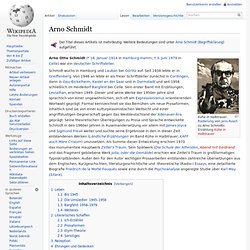
Januar 1914 in Hamburg-Hamm; † 3. Oulipo. Oulipo (French pronunciation: [ulipo], short for French: Ouvroir de littérature potentielle; roughly translated: "workshop of potential literature") is a loose gathering of (mainly) French-speaking writers and mathematicians which seeks to create works using constrained writing techniques. It was founded in 1960 by Raymond Queneau and François Le Lionnais. Other notable members have included novelists Georges Perec and Italo Calvino, poets Oskar Pastior, Jean Lescure and poet/mathematician Jacques Roubaud. The group defines the term littérature potentielle as (rough translation): "the seeking of new structures and patterns which may be used by writers in any way they enjoy. " Constraints are used as a means of triggering ideas and inspiration, most notably Perec's "story-making machine", which he used in the construction of Life A User's Manual.
History[edit] Exercises in Style. Exercises in Style (French: Exercices de style), written by Raymond Queneau, is a collection of 99 retellings of the same story, each in a different style.
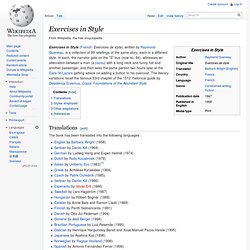
In each, the narrator gets on the "S" bus (now no. 84), witnesses an altercation between a man (a zazou) with a long neck and funny hat and another passenger, and then sees the same person two hours later at the Gare St-Lazare getting advice on adding a button to his overcoat. The literary variations recall the famous 33rd chapter of the 1512 rhetorical guide by Desiderius Erasmus, Copia: Foundations of the Abundant Style. Translations[edit] The book has been translated into the following languages : Because, by their nature, the various retellings of the story employ fine subtleties of the French language, translations into these other languages are adaptations as well as being translations.
Styles employed[edit] Other adaptations[edit] References[edit] Life A User's Manual. Life A User's Manual (the original title is La Vie mode d'emploi) is Georges Perec's most famous novel, published in 1978, first translated into English by David Bellos in 1987.
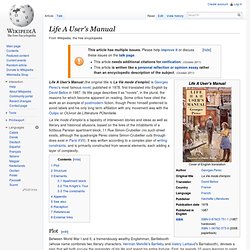
Its title page describes it as "novels", in the plural, the reasons for which become apparent on reading. Some critics have cited the work as an example of postmodern fiction, though Perec himself preferred to avoid labels and his only long term affiliation with any movement was with the Oulipo or OUvroir de LIttérature POtentielle. La Vie mode d'emploi is a tapestry of interwoven stories and ideas as well as literary and historical allusions, based on the lives of the inhabitants of a fictitious Parisian apartment block, 11 Rue Simon-Crubellier (no such street exists, although the quadrangle Perec claims Simon-Crubellier cuts through does exist in Paris XVII). It was written according to a complex plan of writing constraints, and is primarily constructed from several elements, each adding a layer of complexity.
A Void. A Void, translated from the original French La Disparition (literally, "The Disappearance"), is a 300-page French lipogrammatic novel, written in 1969 by Georges Perec, entirely without using the letter e (except for the author's name), following Oulipo constraints.
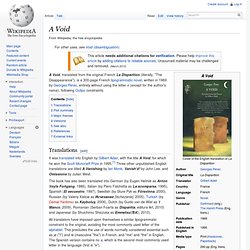
Translations[edit] It was translated into English by Gilbert Adair, with the title A Void, for which he won the Scott Moncrieff Prize in 1995.[1] Three other unpublished English translations are titled A Vanishing by Ian Monk, Vanish'd! By John Lee, and Omissions by Julian West. All translators have imposed upon themselves a similar lipogrammatic constraint to the original, avoiding the most commonly used letter of the alphabet.
This precludes the use of words normally considered essential such as je ("I") and le (masculine "the") in French, and "me" and "the" in English. Plot summary[edit] Major themes[edit] Collected Stories Of William Faulkner : Faulkner,William. : Free Download & Streaming : Internet Archive. In Which These Novels Thrill All Thinking People. Our Novels, Ourselves Every private library should have a handgun and bidet, for similar reasons.

Assembling a distinguished private place for your books is largely the milieu of private people collecting data they've already inputted, in case they should wish for that input to happen again. Now that print is dead, data is all we have. That and unsold copies of The Lexus and The Olive Tree in the discount section of Barnes & Noble. On Thursday we issue our 100 Greatest Novels list, try to be on time. Online Exhibit: Illustration « ASIFA-Hollywood Animation Archive. Faulkner's The Sound and the Fury: A Hypertext Edition. Roberto Bolaño: Ein Roman als Kriegsspiel. Der menschliche Horror mit schwarzem Humor: Roberto Bolaños "Das Dritte Reich" ist ein hoch aufschlussreicher Roman aus dem Nachlass des chilenischen Schriftstellers. 27.
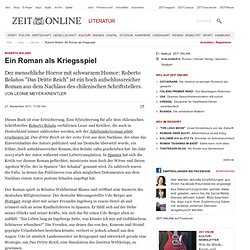
September 2011 11:09 Uhr Speichern Drucken Twitter Facebook Google + Dieses Buch ist eine Erleichterung. Der Roman spielt in Bolaños Wahlheimat Blanes und eröffnet eine Szenerie des deutschen Billigtourismus: Der deutsche Büroangestellte Udo Berger aus Stuttgart steigt dort mit seiner Freundin Ingeborg in einem Hotel ab und erinnert sich an seine Kindheitsferien in Spanien. Anzeige. Free Documents Activities and Lessons at eNotes. Ulysses by James Joyce: Episode 1 - Telemachus. STATELY, PLUMP BUCK MULLIGAN CAME FROM THE STAIRHEAD, bearing a bowl of lather on which a mirror and a razor lay crossed.
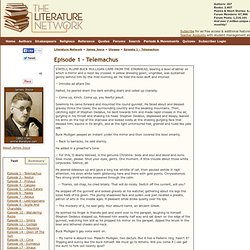
A yellow dressing gown, ungirdled, was sustained gently-behind him by the mild morning air. He held the bowl aloft and intoned: -- Introibo ad altare Dei. Category:Literary archetypes by name.